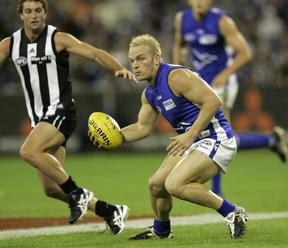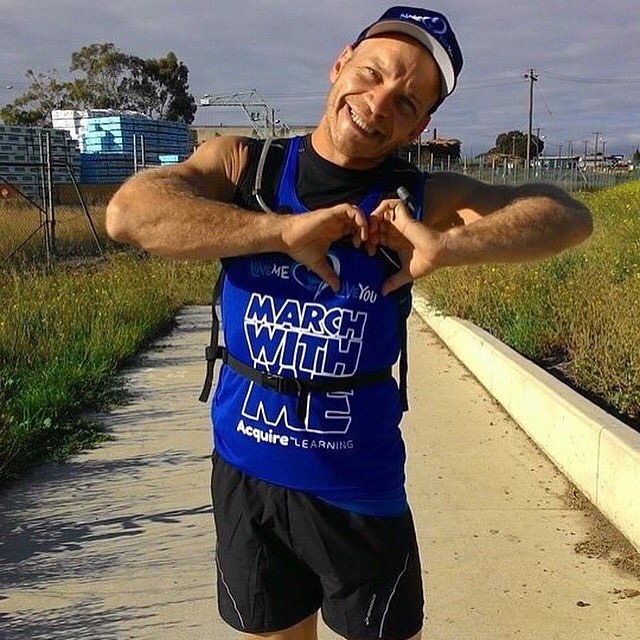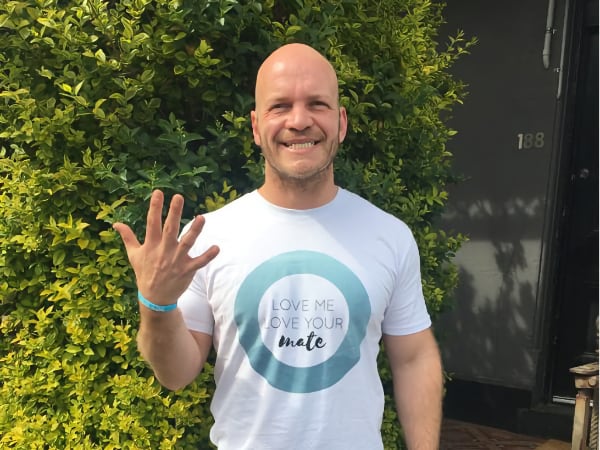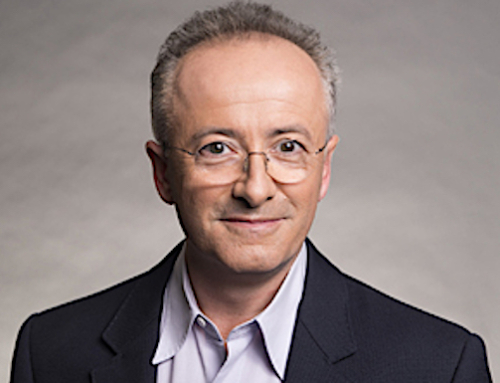By Lance Picioane’s own admission, he was an ‘in your face, hard at it’ AFL player, who made sure opponents understood that he was going to ‘impact every contest’, an approach to which, as a dedicated football follower, I can certainly attest. You can appreciate then my pleasant surprise when upon first meeting Lance I was enveloped in a bear hug. From the wide smile and kind eyes that greeted me, one could be forgiven for not realising the extent to which his life has been affected by dark clouds of anxiety and depression.

Lance in his playing days at North Melbourne Kangaroos
Lance played at the elite level for eight years across three AFL clubs, the Adelaide Crows, Hawthorn and North Melbourne Kangaroos, until he was twenty-five. Moving to South Australia and away from his European family at age seventeen, he experienced the same challenges and adversity which everyone goes through, but dealt with them in a destructive manner. Upon retirement from AFL he ‘fell’ into the party scene and self-medicated with drugs and alcohol to escape the toxicity of his thoughts. The son of former Socceroo Joe Picioane, Lance felt pressure to live up to the family name:
” I didn’t work through it the right way, so results didn’t go my way; I had a lot of anger and bitterness because I thought failures were everybody else’s fault.”
Now with the benefit of hindsight, he realises it was an immense privilege to be the son of a soccer superstar:
“I’ve learnt that the only expectation that matters is the type you put on yourself. Outside voices mean crap, but because we are humans and not robots, it is hard not to take in outside influences!”
Six and a half years since achieving sobriety, Lance is still working through guilt he feels for the effect his struggles had on family, friends, and now-wife Emma:
“The love and support was always there, but I didn’t want it. You don’t want to see what good looks like…that’s the beast [of mental illness]. Every time I talk about my mum in my presentations, I still get choked up.”
A positive mental health journey begins with acknowledging that irrational thoughts are impacting on your ability to lead a productive, safe and fulfilling life. There also needs to be a desire for change and a preparedness to take ownership of thoughts and actions:
“I went and saw the psychologist at the football club hoping they would fix me, but you need to fix yourself through hard work. That support and help is only what you want it to be; professionals can help you with tools, strategies and understanding, but you have to do the work outside of that one hour a week.”
Philosopher Henry David Thoreau wrote: ‘Not until we are lost do we begin to understand ourselves’. Before he sought help Lance thought of himself as being considered honest and trustworthy, but through his recovery he learnt this was not the case- in fact, it was the opposite:
“If you lie to yourself enough, it becomes your truth.”
He used unhealthy defence mechanisms such as deflection, and purposely sabotaged relationships believing that if he didn’t let people in, he couldn’t get hurt. He soon learnt the hard way that this approach was causing him the most pain.
In 2011 following surgery for a dislocated knee, Lance suffered an invasive staphylococcal infection. The possibility of having to amputate his limb if not treated led Lance down a dark spiral where he was firmly in the grip of mental illness and addiction.
For several hours, Lance stood on a rooftop contemplating ending his life when the thought of a possible future stopped him: he desperately wanted to be a husband and father, two roles he would proudly take on in the years to come. On that defining night at the end of 2011, he was able to make a crucial distinction: he didn’t want to die, he just wanted to put an end to the anguish.
The road to recovery was ignited by a seemingly nondescript conversation initiated by his now-wife Emma. She looked deep into his eyes and asked: ‘How are you going? What are you doing? What’s up? Can you talk to me?’ As innocuous as they may sound, it was these non-judgemental questions that allowed him to open up and say: ‘This is not good.’ Emma comforted him for hours whilst he became a ‘blubbering mess’, and then with steely resolve, asked what he wanted to do about how he was feeling:
“That was important; she didn’t have the answer, she let me decide.”
His response of ‘I’m tired of feeling like crap, I want to get better’ enabled a treatment plan to be put in place, with the help of trusted North Melbourne doctor Con Mitropoulos. Lance saw a range of psychologists with whom he couldn’t connect and he did a lot of soul searching; it was only once he sought help at the Melbourne Clinic that he felt able to confide in a psychiatrist:
“To people who say that counselling doesn’t work for them, or that they didn’t feel comfortable with a psychologist, I say: ‘Try another one, try again and again’. [Therapy] should be viewed as an investment in your health and health is your number one asset.”
Intensive therapy sessions assisted Lance to connect the ‘how and why’ to his emotional responses and presented a harsh reality: it was now time for him to attend to his mental health, now or never. The psychiatrist encouraged him to take on a mission to bring the ‘yes’ back into his life. As a ‘big stuff-you’ to the possibility of not walking again, Lance’s chosen mission was to walk the 920km journey from Sydney to Melbourne to raise funds for, and awareness of, mental illness. (Author’s note: Sound familiar? If not, you haven’t read enough of the profiles on this site! Check out Joey Rush from Walking it Off.) Encouraged by the degree to which the Australian public rallied behind Lance, Emma Picioane suggested he ‘do something more’.
A mere seven months after that fateful night on the rooftop and five months after he sought professional help, Lance gathered a network of his closest friends into a room and asked for their support in what he was trying to establish:
“Their one hundred percent commitment enabled me to put my Superman cape on and say: ‘We’re going to do this.’ The hardest thing to do in life is to do things by yourself so gather your network, gather your support and drive your life with passion.”
Love Me Love You Foundation was launched by Lance Picioane and Luke Livingston (now Company Chairman) in 2013. The non-for-profit organisation works to ’empower and build resilience in young adults’ and break down the stigma that often accompanies mental illness. Lance is committed to ensuring no-one has to suffer the same mental he had and, by virtue of being an ex-footballer, the platform he was given has the potential to open doors in the business world. Through educational programs, well-being programs and treatment pathways, the organisation works to improve the health of youth, support parents and carers, and reduce the incidence of mental illness on a societal level:
“In some sense, I don’t want to do what I do, because I don’t want mental health to be such a damning issue. In fifteen years time, if I’m out of a job, we’ve done our job and achieved our aim.”
The Love Me Love You team acts as a ‘professional friend’ with their market difference being the ability to connect through lived experience:
“The more we open ourselves up, the easier it is for people to connect. We show what was and what can be. Every time I talk about my path, even though it was dark and scary, I feel that little bit better.”
Until Cherie joined him in 2014 overseeing marketing and events, Love Me Love You was a one-man-band, with Lance on his own in the office. Now with a team of seven staff, the organisation can make a greater contribution to positive mental health journeys. Their tasks involve relationship building, program evaluation, case management and delivering presentations and programs including a fresh focus on program delivery in rural and remote areas.

In its second year of operation, Lance walked 220kms in four days, whilst in its third year, the organisation hosted a 105km walk from Portsea to Port Melbourne. Earlier this year over 700 participants took part in March With Me, walking a total of 16,800kms and raising over $200,000 for mental health awareness. During the events, people are encouraged to walk in groups as a metaphor and reminder that ‘no-one travels their journey alone’. The next event Ride With Me: Around the Bay in a Day will be held on 7th of October this year.

Last year alone, the organisation provided on-going support to hundreds of people needing to access and navigate services to improve psychological well-being and lifestyle choices. Working as a personal trainer after football, Lance ensures such referrals are not limited to psychologists and psychiatrists but cover all services contributing to a more positive mindset, such as fitness instructors, exercise physiologists and nutritionists.
The key tenant of Love Me Love You is education. In 2017, seminars, workshops and behavioural change programs were conducted across the country with over 15,000 participants. The aim is to make a complex subject simple:
“In our sessions we often talk about: ‘What do you look for in a friend? What does support mean to you? What are the values you want in a friend?’ We also focus on understanding the underlying causes of mental illness and develop strategies for fronting up to the situations in our lives that have been not what we want. We run workshops where we discuss our reactions to stressors and the impact of challenges and talk about how we align our behaviours with our values to make sure we have a positive mental health journey.”
This alignment of behaviour and values was of particular relevance during the recent Men’s Health Week:
“We’re talking a lot about: ‘What does it mean to be a man?’ and ‘How do you link strength and vulnerability?'”
Lance is all-too-familiar with the stereotype of masculinity being synonymous with lack of emotion:
“My dad is a hard-arse Eastern European, he also has bipolar disorder and severe anxiety but never spoke about it. It is a generational and cultural attitude: masculinity is ‘the Aussie way’ – you must show strength and courage, and not show weakness or emotion, you just get things done.”
His work as a mental health advocate demonstrates that times have changed:
“[Society is] more educated, understanding and more resourced, so more people are acknowledging the existence of mental illness.”
It is the responsibility of all Australians to have (at least) a basic understanding of the socio-economic consequences of poor mental health. With statistics showing one in four people struggle with anxiety and/or depression, no-one is immune:
“Take me – I look like I can headbutt a wall, but I have had struggles and I am now on the other side having learnt to show vulnerability. It is also important to note that affluence doesn’t make a difference – it is just triggered through different stressors. Different communities just emphasise different values and have varying resilience abilities.”
People become adept at masking their struggles and often don’t have the capacity to reach out overtly. Instead there may be subtle changes in appearance, language or behaviour. If you recognise that a friend is struggling, Lance says that whilst offering support is important, you must remember that you are not a substitute for professional help:
“Your role is to only to open up conversation to trigger an emotion which sparks the thought: ‘I need to get some professional help.’ Your aim should be to alter their thinking by showing love. Small non-confronting, non-judgemental, non-invasive gestures such as text messages, invites to coffee or invites to movies all have a big impact.”
The go-to words of comfort ‘I know how you feel’ have good intentions but are largely unhelpful. They take the focus away from the person struggling and change the conversation to how you think they should feel, rather than acknowledging their reality.
As evidenced by the recent loss of designer Kate Spade and chef Anthony Bourdain, suicide has become a much too common option for people battling psychological demons. Although the media undoubtedly has a duty of care in the way such events are reported, Lance believes the popularity of Netflix original series 13 Reasons Why is a step in the right direction:
“Such shows open up the conversation about mental illness. We’re still at a point where we need to smack people around the head so that they acknowledge its existence. If people keep sweeping their struggles under the rug, they will eventually trip over the rug.”
In the week of this interview, Lance has had discussions with four families whose children are on suicide watch. He wants people to know that life can get better and although mood doesn’t improve overnight, there are more positive stories of recovery every day:
“I still have to work hard on who I am. I go to the gym three to four times a week, and I watch what I eat. I don’t drink because I don’t want my judgement as a husband and parent to be compromised. Difficulties still pop up, but I do work on understanding my triggers and managing them every day. It’s about opening myself up to experiences and not shying away from things that scare me. When challenges do arise, I need to get back up and say, ‘It doesn’t define me, what am I going to do about it? Let’s go.’ That way I have a plan.”
Lance’s face lights up when he speaks of waking up to his own young sons Alexander and Lennox. He describes them as his motivation for living, the realisation of his dream to be a family man. Whilst he believes he is ‘at the top of my game in being able to recognise what’s going on’, he admits that should his children experience similar psychological struggles, recognising symptoms from inside the family circle can be difficult:
“As a father, my job is to pass on an ability to recognise issues for themselves. My boys need to go through some crap and learn how to bounce back because you can’t be there every minute of the day. Though what I can do is provide unconditional love and support.”
As a non-for-profit, Love Me Love You is very appreciative of all donations and corporate partnerships. However, more than anything the team needs YOU:
“Everyone can help – this space has no wrong answers if your heart is in the right place. If you don’t know how to help, contact us and ask!”
The long-term organisational aim is to have Love Me Love You well-being programs integrated into school curricula, so stay tuned!
Lance views the Love Me Love You ethos as a way of life – it is the ability to eyeball yourself and say ‘I love you, I love who you are’:
“I now live out honesty and respect; I have found that it flows on to others. If hardships occur, I need to learn to adapt. Do I love myself though to keep going? 100%!”
If you or someone you know is struggling, please reach out. Love Me Love You is just one of a number of valuable mental health support services. For immediate assistance call Lifeline on 13 11 14.
To offer your assistance to the team at Love Me Love You, please visit the website or Facebook page.






